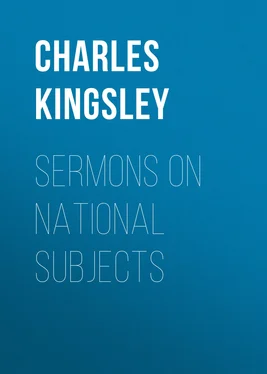Charles Kingsley - Sermons on National Subjects
Здесь есть возможность читать онлайн «Charles Kingsley - Sermons on National Subjects» — ознакомительный отрывок электронной книги совершенно бесплатно, а после прочтения отрывка купить полную версию. В некоторых случаях можно слушать аудио, скачать через торрент в формате fb2 и присутствует краткое содержание. Жанр: foreign_antique, Философия, foreign_edu, на английском языке. Описание произведения, (предисловие) а так же отзывы посетителей доступны на портале библиотеки ЛибКат.
- Название:Sermons on National Subjects
- Автор:
- Жанр:
- Год:неизвестен
- ISBN:нет данных
- Рейтинг книги:3 / 5. Голосов: 1
-
Избранное:Добавить в избранное
- Отзывы:
-
Ваша оценка:
- 60
- 1
- 2
- 3
- 4
- 5
Sermons on National Subjects: краткое содержание, описание и аннотация
Предлагаем к чтению аннотацию, описание, краткое содержание или предисловие (зависит от того, что написал сам автор книги «Sermons on National Subjects»). Если вы не нашли необходимую информацию о книге — напишите в комментариях, мы постараемся отыскать её.
Sermons on National Subjects — читать онлайн ознакомительный отрывок
Ниже представлен текст книги, разбитый по страницам. Система сохранения места последней прочитанной страницы, позволяет с удобством читать онлайн бесплатно книгу «Sermons on National Subjects», без необходимости каждый раз заново искать на чём Вы остановились. Поставьте закладку, и сможете в любой момент перейти на страницу, на которой закончили чтение.
Интервал:
Закладка:
Do you doubt my words? At all events you confess that the cure of all diseases comes from Christ. Then consider, I beseech you, how many more diseases are cured now than were formerly. One may say that the knowledge of medicine is not one hundred years old. Nothing, my friends, makes me feel more strongly what a wonderful and blessed time we live in, and how Christ is showing forth mighty works among us, than this same sudden miraculous improvement in the art of healing, which has taken place within the memory of man. Any country doctor now knows more, thank God, or ought to know, than the greatest London physicians did two generations ago. New cures for deafness, blindness, lameness, every disease that flesh is heir to, are being discovered year by year. Oh, my friends! you little know what Christ is doing among you, for your bodies as well as for your souls. There is not a parish in England now in which the poorest as well as the richest are not cured yearly of diseases, which, if they had lived a hundred years ago, would have killed them without hope or help. And then, when one looks at these great and blessed plans for what is called sanitary reform, at the sickness and the misery which has been done away with already by attending to them, even though they have only just begun to be put in practice—our hearts must be hard indeed if we do not feel that Christ is revealing to us the gifts of healing far more bountifully and mercifully than even He did to the first apostles.
But you will say, perhaps, the dead are not raised in these days. Oh, my friends! which shows Christ’s mercy most, to raise those who are already dead, or to save those alive who are about to die? Those in this church who have read history know as well as I, how in our forefathers’ time people died in England by thousands of diseases which are scarcely ever deadly now; ay, of diseases which have now actually vanished out of the land, before the new light of medicine and of civilisation which Christ has revealed to us in these days. For one child who lived and grew up in old times, two live and grow up now. In London alone there are not half as many deaths in proportion to the number of people as there were a hundred years ago. And is not that a mightier work of Christ’s power and love than if He had raised a few dead persons to life?
And now for the last part of our Lord’s witness about Himself. To the poor the gospel is preached. Oh! my friends, is not that coming true in our days as it never came true before? Look back only fifty years, and consider the difference between the doctrines which were preached to the poor and the doctrines which are preached to them now. Look round you and see how everywhere earnest and godly ministers have sprung up, of all sects and opinions, as well as of the Church of England, not only to preach the gospel in the pulpit, but to carry it to the sick bedside of the lonely cottage, to the prison, and to those fearful sties, worse than prisons, where in our great cities the heathen poor live crowded together. Look at the teaching which the poor man can get now, compared to what he used to—the sermons, the Bibles, the tracts, the lending libraries, the schools—just consider the hundreds of thousands of pounds which are subscribed every year to educate the children of the poor, and then say whether Christ is not working a mighty work among us in these days. I know that not half as much is done as ought to be done in that way; not half as much as will be done; and what is done will have to be done better than it has been done yet; but still, can anyone in this church who is fifty years old deny that there is a most enormous and blessed improvement which is growing and spreading every year? Can anyone deny that the gospel is preached to the poor now in a way that it never was before within the memory of man?
Now, recollect that this is an Advent sermon—a sermon which proclaims to you that Christ is come ; yes, He is come—come never to leave mankind again! Christ reigns over the earth, and will reign for ever. At certain great and important times in the world’s history, like this present time, times which He Himself calls “days of the Lord,” He shows forth His power, and the mightiness and mercy of His kingdom, more than at others. But still He is always with us; we have no need to run up and down to look for Christ: to say, Who shall ascend into heaven to bring Him down? Who shall descend into the deep to bring Him up? For the kingdom of God, as He told us Himself, is among us, and within us. Yes, within us. All these wonderful improvements and discoveries, all things beneficial to men which are found out year by year, though they seem to be of men’s invention, are really of Christ’s revealing, the fruits of the kingdom of God within us, of the Spirit of God, who is teaching men, though they too often will not believe it; though they disclaim God’s Spirit and take all the glory to themselves. Truly Christ is among us; and our eyes are held, and we see Him not. That is our English sin—the sin of unbelief, the root of every other sin. Christ works among us, and we will not own Him. Truly, Jesus Christ may well say of us English at this day, There were ten cleansed, but where are the nine? How few are there, who return to give glory to God! Oh, consider what I say; the kingdom of God is among us now; its blessings are growing richer, fuller among us every day. Beware, lest if we refuse to acknowledge that kingdom and Christ the King of it, it be taken away from us, and given to some other nation, who will bring forth the fruits of it, fellow-help and brotherly kindness, purity and sobriety, and all the fruits of the Spirit of God.
IV.
A PREPARATION FOR CHRISTMAS
Rejoice in the Lord always.—Philippians iv. 4.
This is the beginning of the Epistle for to-day, the Sunday before Christmas. We will try to find out why it was chosen for to-day, and what lesson we may learn from it.
Now Christmas-time was always a time of rejoicing among many heathen nations, and long before the Lord Jesus Christ came. That was natural and reasonable enough, if you will consider it. For now the shortest day is past. The sun is just beginning to climb higher and higher in the sky each day, and bring back with him longer sunshine, and shorter darkness, and spring flowers, and summer crops, and a whole new year, with new hopes, new work, new lessons, new blessings. The old year, with all its labours and all its pleasures, and all its sorrows and all its sins, is dying, all but gone. It lies behind us, never to return. The tears which we shed, we never can shed again. The mistakes we made, we have a chance of mending in the year to come. And so the heathens felt, and rejoiced that another year was dying, another year going to be born.
And Christmas was a time of rejoicing too, because the farming work was done. The last year’s crop was housed; the next year’s wheat was sown; the cattle were safe in yard and stall; and men had time to rest, and draw round the fire in the long winter nights, and make merry over the earnings of the past year, and the hopes and plans of the year to come. And so over all this northern half of the world Christmas was a merry time.
But the poor heathens did not know the Lord. They did not know who to thank for all their Christmas blessings. And so some used to thank the earth for the crops, and the sun for coming back again to lengthen the days, as if the earth and sun moved of themselves. And some used to thank false gods and ancient heroes, who, perhaps, never really lived at all. And some, perhaps the greater number, thanked nothing and no one, but just enjoyed themselves, and took no thought, as too many do now at Christmas-time. So the world went on, Christmas after Christmas; and the times of that ignorance, as St. Paul says, God winked at. But when the fulness of time was come, He sent forth His Son, made of a woman, to be the judge and ruler of the world; and commanded all men everywhere to repent, and turn from all their vanities to serve the living God, who had made heaven and earth, and all things in them.
Читать дальшеИнтервал:
Закладка:
Похожие книги на «Sermons on National Subjects»
Представляем Вашему вниманию похожие книги на «Sermons on National Subjects» списком для выбора. Мы отобрали схожую по названию и смыслу литературу в надежде предоставить читателям больше вариантов отыскать новые, интересные, ещё непрочитанные произведения.
Обсуждение, отзывы о книге «Sermons on National Subjects» и просто собственные мнения читателей. Оставьте ваши комментарии, напишите, что Вы думаете о произведении, его смысле или главных героях. Укажите что конкретно понравилось, а что нет, и почему Вы так считаете.












